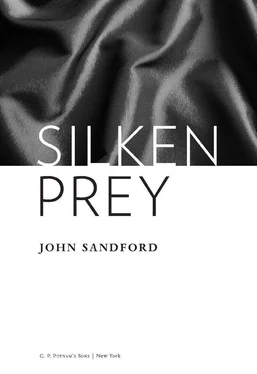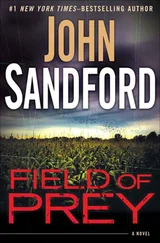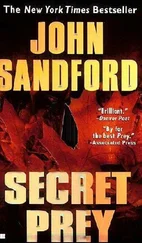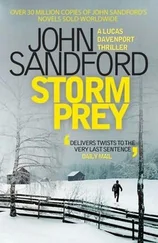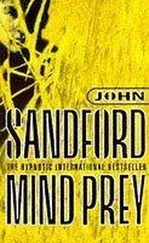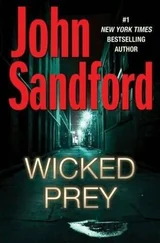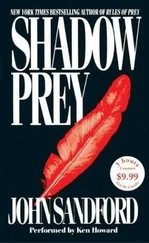Lucas left the Porsche at the curb, said hello to a patrol sergeant he’d known for twenty years or so, and crossed the lawn to the small front porch, where Cochran was sitting in an aluminum lawn chair. Cochran was a big man, fleshy-faced with a gut, and the lawn chair was his, kept in the trunk of his car, so he’d have somewhere to sit when he was working around a crime scene.
“Why’s it not like a robbery?” Lucas asked.
“Didn’t take enough stuff,” Cochran said. He was wearing gray flannel slacks, a red tie, and a blue blazer; he looked like a New York doorman. “She had quite a bit of takable stuff, lying around loose. The thing is, when something like this happens, either the shooter runs, instantly, or he stays around long enough to accomplish the mission. It’s not very often that they stay around for fifteen seconds. It’s either nothing, or five minutes. But why am I telling you that?”
“I would not be confident in that generalization when applied to a specific case,” Lucas said.
“Jeez, you know a lot of big words,” Cochran said. “If I understood them all, I agree— somebody might stay around for fifteen seconds, like this guy did, but not often.”
“You got a time for it?”
“Right around one in the morning. Actually, since you ask, about five after one. A guy was watching TV up the street, heard a shot. If that was the shot. The thing is, he said it sounded like a shotgun: a big BOOM. I asked him if he knew what a shotgun sounded like, and he said yeah, he’s a turkey hunter. But: the medical examiner’s guy tells me that it looks like Roman was shot by a small-caliber weapon, probably a .22. Inside the house. Windows and doors all closed. I’m not even sure that could be heard, five houses away.”
Lucas said, “Huh.” And, “So you haven’t figured out the boom .”
“No, but who knows? Maybe that was the shot. The ME’s guy says it looks pretty consistent with a one-o’clock shooting, the condition of the blood and the body temp.”
“Who found the body?”
“A woman named Carmen West,” Cochran said. “She puts up lawn signs for Smalls around the north end.”
“Sounds like dangerous work,” Lucas said.
“You mean because Smalls is a right-wing devil, and right-wing devils are not liked on the north side?”
“Something like that. Anyway . . .”
“Roman was supposed to be at work at six o’clock this morning,” Cochran said. “Last days of the campaign, and all that. When she didn’t show by eight, somebody at the office phoned West and asked her to knock on Roman’s door. West said the door was open. . . . She looked in, and saw Roman in the hallway. Called 911.”
“All that seems legit?”
“Yeah, it does.” Cochran pushed himself out of his chair. “Come on in, I’ll show you around.”
Lucas followed him up to the porch and Cochran said, “Notice the door.”
“Nothing there,” Lucas said, checking out the door.
“It wasn’t forced,” Cochran said. “We can’t find anything forced. Either the door was unlocked, which seems unlikely for a single woman, or the guy had a key. We talked to the neighbors, who said she didn’t have a housekeeper, and her only relative—an heir—is her daughter, who lives in Austin, Texas, and was there this morning and took our call.”
“Roman didn’t have a boyfriend?”
“Daughter says no. She said they talked once or twice a week.”
• • •
LUCAS HAD BEEN TO all kinds of murder scenes in his career, and this was like most of them: that is, like nothing in particular. Another house with a worn couch and a newer TV and personal photos on the wall. A kitchen smelling of last night’s single-serving pepperoni pizza, dishes in the kitchen sink, waiting to be washed, but now with nobody to wash them.
And, of course, a dead body in the hallway.
Roman was flat on her back, her hands crossed on her chest. She had a slash across her face, which Cochran thought might have come from a gun sight. Her eyes were closed, which was better than open, for the cops, anyway; for Roman, it made no difference. “It looks like the shooter encountered her in the hallway, hit her with the gun, then shot her,” Cochran said.
“Or vice versa.”
“Could be. Can’t tell her posture when she was hit, because the bullet’s still inside. No exit, no trajectory.” As he spoke, Lucas heard a gust of laughter, from somewhere behind the house: children playing.
“Goddamnit. I need to talk with her,” Lucas said, looking down at the body. “I mean, we could have either a multiple murderer, or a freakin’ weird coincidence.”
“I might be able to help you with that, with the one-or-the-other,” Cochran said. He squatted, carefully, dug inside his jacket for a pencil, and pointed the pencil at a patch of black fabric under one of her arms. “See that? That’s a man’s glove. It’s pinned under her. There’s only one glove, nothing else like it in the house. We’re thinking . . .”
“Could be the killer’s.”
“Yeah. Either pulled off, or dropped out of a pocket,” Cochran said. “Anyway, there’s gonna be all kinds of DNA in it. If we get lucky . . .”
If they got lucky, they’d get a cold hit from the Minnesota DNA bank. All felons in Minnesota were DNA-typed.
“How soon?”
“Tomorrow morning. It’ll be our top priority,” Cochran said.
“I may send you a couple of swabs.”
“Yeah?”
“Maybe,” Lucas said.
• • •
LUCAS SAW A TOTE BAG sitting by the corner of the bed, and what appeared to be the silvery corner of a laptop poking out of it. “Would you mind taking the laptop out and turning it on?”
Cochran said, “No, I don’t mind. . . . It doesn’t seem too connected to the shooting scene. But it should have been stolen.” He slipped the laptop out and said, “This isn’t good.”
“What?”
“It’s a Mac PowerBook, like mine. The first screen you come to is gonna want a password.”
“Let’s give it a try,” Lucas said. Cochran didn’t want to put it down on anything the killer might have touched, so they carried it back outside, and he handed the laptop to Lucas and sat down in his lawn chair. Lucas sat on the stoop below him and turned it on. When they got to the password, Lucas asked, “What was the daughter’s name?”
“Callie . . . Roman.”
Lucas typed “Callie” into the password slot, and the computer opened up.
“Christ, it’s like you’re a detective,” Cochran said.
Lucas went to the e-mail and started scrolling backwards. He found a BLTUBBS on the second page down, turned to Cochran and said, “It’s not a robbery.”
“Do tell?”
“Well, maybe not. But if it is, we really are ass-deep in coincidence.”
He found a half-dozen messages from Tubbs in the past three weeks. Tubbs and Roman had been talking about something, but the messages were never specific. “Call you this evening . . .” and “Where will you be tonight?”
The replies were as short and nonspecific as the questions. The only thing that might mean something was a note from Tubbs that said: “Got the package. Talk to you tonight. Call me when you get home.” The message was sent four days before the porn popped up on Smalls’s computer. The last access of the pornography on the Minneapolis police computers had been five days before.
Lucas asked Cochran, “Cell phone?”
He shook his head. “No cell phone, but she didn’t have a landline, either. The killer took the cell. Like he should have taken the computer,” Cochran said. “You want to give me the whole rundown on this?”
• • •
LUCAS SHUT DOWN the computer and handed it back to Cochran, stood up, dusted off the seat of his pants, leaned against the porch banister, and told him about the investigation, leaving out only what was necessary. When he was done, Cochran said, “You never talked to her? I mean, you talked to her, but you didn’t interview her?”
Читать дальше
